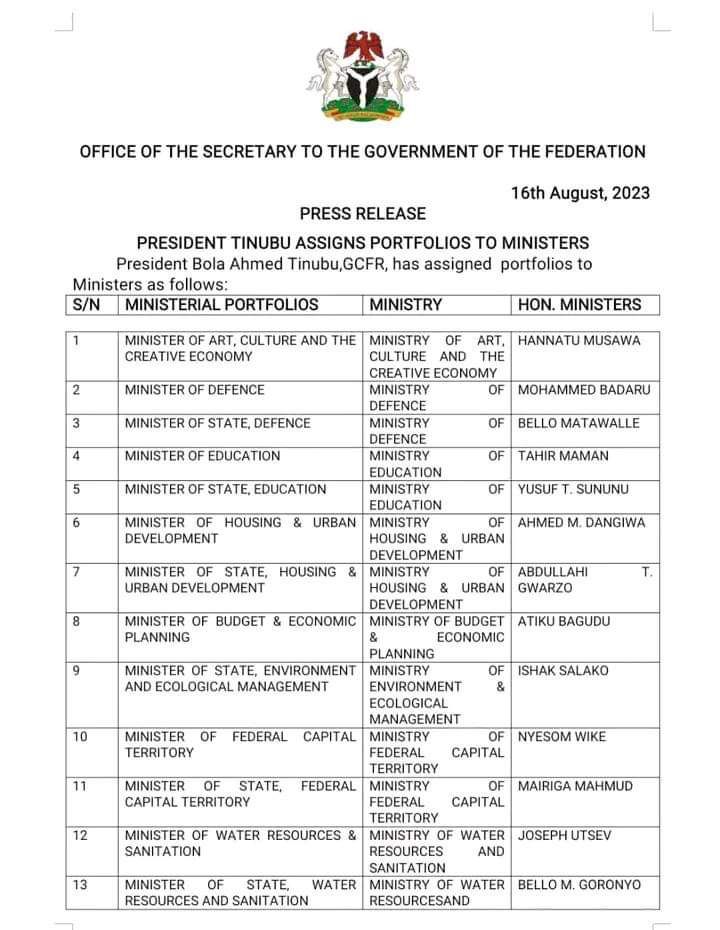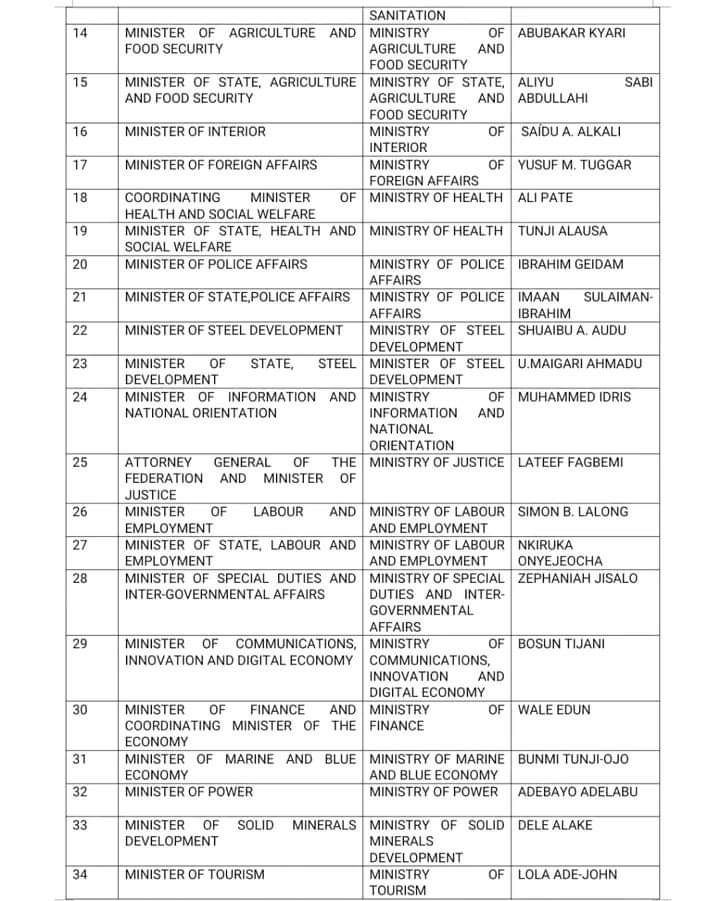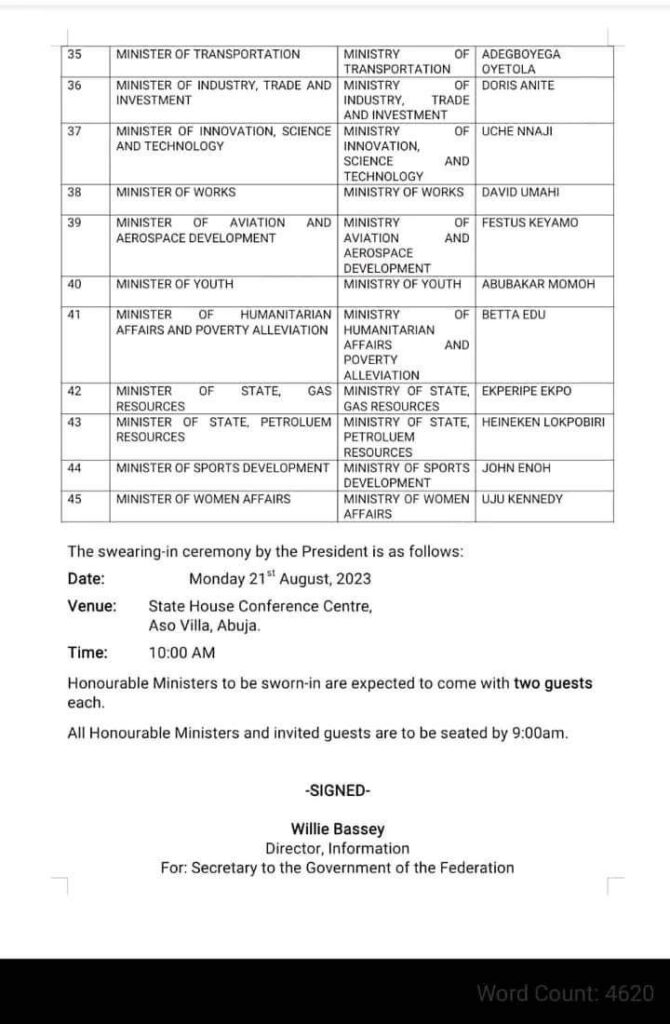News
Tinubu Names Wike FCT Minister, Keyamo Aviation Minister, 43 Others Receive Portfolios (See Full List)

President Bola Tinubu has released the portfolios for the 45 confirmed ministerial nominees with former Rivers State governor Nyesom Wike in charge of the Ministry of Federal Capital Territory (FCT) and Festus Keyamo manning the Ministry of Aviation.
Other ministers are Wale Edun (Finance and Coordinating Minister of the Economy), Adegboyega Oyetola (Transportation), David Umahi (Works), Festus Keyamo (Aviation and Aerospace Development), and Betta Edu (Humanitarian Affairs and Poverty Alleviation).
The list was released in a statement made available to Channels Television on Wednesday.
See the full list below:
- Minister of Communications, Innovation and Digital Economy, Bosun Tijani
- Minister of State, Environment and Ecological Management, Ishak Salaco
- Minister of Finance and Coordinating Minister of the Economy Wale Edun
- Minister of Marine and Blue Economy, Bunmi Tunji
- Minister of Power, Adedayo Adelabu
- Minister of State, Health and Social Welfare, Tunisia Alausa
- Minister of Solid Minerals Development, Dele Alake
- Minister of Tourism, Lola Ade-John
- Minister of Transportation, Adegboyega Oyetola
- Minister of Industry, Trade and Investment, Doris Anite
- Minister of Innovation Science and Technology, Uche Nnaji
- Minister of State, Labour and Employment, Nkiruka Onyejeocha
- Minister of Women Affairs, Uju Kennedy
- Minister of Works, David Umahi
- Minister of Aviation and Aerospace Development, Festus Keyamo
- Minister of Youth, Abubakar Momoh
- Minister of Humanitarian Affairs and Poverty Alleviation, Betta Edu
- Minister of State, Gas Resources, Ekperikpe Ekpo
- Minister of State, Petroleum Resources, Heineken Lokpobiri
- Minister of Sports Development, John Enoh
- Minister of Federal Capital Territory, Nyesom Wike
- Minister of Art, Culture and the Creative Economy, Hannatu Musawa
- Minister of Defence, Mohammed Badaru
- Minister of State Defence, Bello Matawalle
- Minister of State Education, Yusuf T. Sunumu
- Minister of Housing and Urban Development, Ahmed M. Dangiwa
- Minister of State, Housing and Urban Development, Abdullah T. Gwarzo
- Minister of Budget and Economic Planning, Atiku Bagudu
- Minister of State, Federal Capital Territory, Mairiga Mahmud
- Minister of State, Water Resources and Sanitation, Bello M. Goronyo
- Minister of Agriculture and Food Security, Abubakar Kyar
- Minister of Education, Tahir Maman
- Minister of Interior, Sa’Idu A. Alkali
- Minister of Foreign Affairs, Yusuf M. Tuggar
- Coordinating Minister of Health and Social Welfare, Ali Pate
- Minister of Police Affairs, Ibrahim Geidam
- Minister of State, Steel Development, U. Maigari Ahmadu
- Minister of Steel Development, Shuaibu A. Audu
- Minister of Information and National Orientation, Muhammed Idris
- Attorney General of the Federation and Minister of Justice, Lateef Fagbemi
- Minister of Labour and Employment, Simon B. Lalong
- Minister of State, Police Affairs, Imaan Sulaiman-Ibrahim
- Minister of Special Duties and Inter-Govermental Affairs, Zephaniah Jisalo
- Minister of Water Resources and Sanitation, Joseph Utsev
- Minister of State, Agriculture and Food Security, Aliyu Sabi Abdullahi
- Minister of Environment and Ecological Management, (Kaduna)
News
UNICEF Lauds Nigeria’s Remarkable Progress in Birth Registration (Photos)

ighlights 14 Million Children Registered in Two Years.
The United Nations Children’s Fund (UNICEF) has commended Nigeria for achieving a significant milestone in child rights, with 14 million children’s births officially registered over the past two years.

This surge represents impressive advancement in ensuring every child is counted and recognized through legal identity.
The announcement came during a courtesy visit by UNICEF Country Representative to Nigeria, Ms. Wafaa Saeed Abdelatef, to Senator Oluremi Tinubu, the First Lady of Nigeria, at the State House in Abuja.
Ms. Abdelatef praised the First Lady’s exemplary leadership in championing children’s issues and family welfare nationwide. She described the progress in birth registration as unprecedented in her experience across various countries.

“Birth registration is the first right of every child—to be counted and recognized,” she stated. “It is really impressive. I have served in many places, but I have not seen such progress in two years as we have witnessed here in Nigeria.
“She highlighted key enablers of this success, including the digitalization of the registration system at health facilities and community levels, as well as ongoing legislative efforts with a relevant bill before the National Assembly.

“Things don’t just happen like that; we scale with leadership,” she added, expressing gratitude for the First Lady’s role in driving this initiative and allowing UNICEF to celebrate this “fantastic leadership.
“The UNICEF representative also acknowledged the First Lady’s broader contributions, referencing her involvement in initiatives such as the national library and food bank launches, as well as commendations from African women leaders at the African Union for her continental impact.

She linked these efforts to Nigeria’s Renewed Hope Agenda, which she said is instilling hope for children and citizens alike.In response, Senator Oluremi Tinubu welcomed UNICEF’s recognition and reaffirmed her commitment to ensuring universal birth registration. “Every child counts,” she emphasized, noting that registration immediately after birth grants children nationality, legal identity, and access to essential services like health and education.
The First Lady described the news as a source of joy and a foundation for national development. “This is how nations develop,” she said. While celebrating the gains, she stressed the need for sustained efforts: “We are not there yet. We have to keep at it and make sure every child is counted.
“She pointed out that birth registration is just the starting point, extending to the issuance of birth certificates. Highlighting Nigeria’s lack of a recent census, she noted that starting with children would provide critical data on the child population to guide government planning and resource allocation.
Senator Tinubu also addressed persistent challenges, expressing concern over persistently high rates of tuberculosis, HIV/AIDS, and maternal and child mortality in Nigeria’s large population.
“These numbers are still high, and it is worrisome,” she said, while assuring that the administration is actively working to position the country for a better future.
She expressed appreciation for UNICEF’s longstanding support and reliable data, pledging continued collaboration in any area of mutual interest. “In any area you want us to collaborate, we are here,” she affirmed. “We want to thank UNICEF for the interest and the work you have done.
“This development underscores Nigeria’s ongoing push toward universal civil registration, aligning with global goals to provide legal identity for all children and support broader child rights and development objectives.
News
Navy’s Chief of Operations, Rear Admiral Katagum dies in Egypt
Rear Admiral Katagum previously served as the Director, Naval Intelligence., he’s one time Deputy Defence Adviser, Paris, France and was at the Defence Headquarters before his recent appointment as Chief of Operations by the Chief of Naval Staff, Vice Admiral Idi Abass.

Photo: Rear Admiral Musa Katagun
Chief of Operations at Naval headquarters, Rear Admiral Musa Katagun is dead at a hospital in Egypt.
News of Rear Admiral Katagun’s death was confirmed by military sources on Thursday.
Katagum is said to have traveled to Egypt for follow up medical evaluation after undergoing an initial surgery in September last year.
Rear Admiral Katagum previously served as the Director, Naval Intelligence., he’s one time Deputy Defence Adviser, Paris, France and was at the Defence Headquarters before his recent appointment as Chief of Operations by the Chief of Naval Staff, Vice Admiral Idi Abass.
News
Ondo monarch gunned down outside palace
The armed men were said to have attempted to kidnap him but he refused, resulting to being shot.

•Kehinde Jacob Faledon
Kehinde Jacob Faledon, the traditional ruler of Agamo Community in Akure North Local Government Area of Ondo State, has been shot dead.
Police Public Relations Officer in Ondo, Jimoh Abayomi, confirmed the incident, said that the monarch was killed after gunmen forced him out of the palace, on Wednesday night.
The armed men were said to have attempted to kidnap him but he refused, resulting to being shot.
“Information reached the division at about 7:50pm from a community leader, High Chief Ajewole Clement of New Town, Itaogbolu, that about six armed men stormed the residence of the monarch and forcibly took him away,” Abayomi said.
“The victim was subsequently found with gunshot injuries and was confirmed dead at the scene.
“The divisional police officer supported by tactical teams of the command, mobilised officers in collaboration with local hunters, Atuluse Security, and Amotekun operatives are combing the surrounding bushes and neighbouring communities.
-

 News3 days ago
News3 days agoOndo monarch gunned down outside palace
-

 News3 days ago
News3 days agoDSS suit against SERAP adjourns indefinitely
-

 Politics3 days ago
Politics3 days agoRivers lawmakers halt impeachment of Fubara and Odu, following Tinubu’s interventions
-

 Politics2 days ago
Politics2 days agoAbuja Area Council Elections Hold Tomorrow
-

 Business3 days ago
Business3 days agoNAFDAC Seals 18 Warehouses Over Expired Products in Niger State
-

 News3 days ago
News3 days agoSenator Mpigi Dies at 64
-

 Business3 days ago
Business3 days agoWema Bank Announces Grand Event for International Women’s Day 2026 on March 4
-

 International3 days ago
International3 days agoTrump kicks off his ‘Board of Peace,’ as war clouds loom on Iran





















